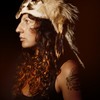-The Lower Ninth Ward, Ten Years After Katrina -Living With My Post-Katrina Survivor's Guilt -William Widmer Captures Life in Post-Katrina New Orleans with 'My Mississippi'If you were a teenager in New Orleans East in 2006 or '07, there wasn't much to do. That part of the city had been a white flight destination in the 60s, the home of a black middle class by the late 70s, and since then had slowly been falling into disrepair thanks to the oil bust in the 80s and rising rates of poverty and crime.
C. J., 21, at Parisite Skatepark. 2015
Brad, 20, doing an ollie in New Orleans East. 2015
Fredrick, 22, at Parisite Skatepark. 2015
"There was one lady security guard—I asked her if I could land my trick before she kicked us out. She said yeah, she said she wanted to see us be something." –Lance, 16
Anthony, 16, doing a backside disaster at Parisite Skatepark. 2015
Lance, 16:I went to Jacksonville, Florida, for Katrina. I was six. We came back about a year later. I started skating when I was 12. I was in the East—I've been there my whole life. My older cousin started skating—he was just skating by himself out here in the East. We shared a board until I started learning my own tricks. I was on YouTube, learning tricks. My cousin doesn't skate anymore, so I was just skating by myself out here. I started going downtown, to Humidity [skate shop] and I started hooking up with beaucoup people downtown.We skated every day. I skated at Poydras, One Shell, the Convention Center, and Armstrong Park. The park is the only place you can really skate without getting kicked out. At One Shell you have at least ten minutes [to skate] before [security comes] out. They knobbed [metal deterrents on benches] Poydras, so you really can't skate that anymore. There was one lady security guard—I asked her if I could land my trick before I she kicked us out. She said yeah, she said she wanted to see us be something. They had a skate park, [Lil] Wayne's, but it's not open anymore. We got through the window a couple times to skate after it closed down. I like to skate street, mostly rails and stairs. You ain't gotta worry about nothing. We look at the world differently. A normal person would just be like, "Oh, those are stairs." We see if we can skate it. You get momentum from people. Say he jumped down this, it's gonna make me want to do it. Makes us both better."All the people in my family were like, 'What the fuck? You doing that shit now?'" –Fredrick, 22
Bayou Sauvage Wildlife Refuge in New Orleans East, former site of proposed suburban subdivision, in 2014
Watch 'Gone: How Mental Illness Derailed the Career of a Promising Young Skateboarder':
Jamize, 17One of my homies, named Keelan, had been skating for a while [downtown]. We were skating in a basketball court in the Iberville, we started skating right there. Then we started skating on Canal [Street] in front of Sports Plus and all that. I learned tricks by watching videos, and I stole this book from Kipp [, a charter school]. It was about skateboarding. It taught you how to do simple tricks like ollies and kickflips, so I just put it in my backpack. I looked at it when I got home and started learning from there. By me moving around, I had friends with access to internet, so I started watching YouTube a lot.After the Iberville I went to the 12th Ward off Louisiana [Avenue]. I got people skating up there. There wasn't anyone skating—maybe three people up there. There was this kid P. J., and a couple other kids. We would skate uptown in front of Walgreens and Walter L. Cohen. It's non-stop action for me. I hang out with a bunch of different people. I tried to get away from my neighborhood uptown in Calliope. It's a bunch of stuff that happens now and then, all types of shit. Shooting, fights, a lot of danger—I stay away from it. Skating helps me stay away from it a lot. It makes me explore most of the city. It helps me get around a bunch.
"I was in that era where I was called white boy, I was called fag, I was called a bunch of other demeaning things because I skateboarded." –Patrick 'Melon'
Julian, 17, doing a manual in New Orleans East. 2015
Jamize, doing a frontside 180 at Parisite Skatepark. 2015
Chuck, 20, at Parisite Skatepark. 2013
